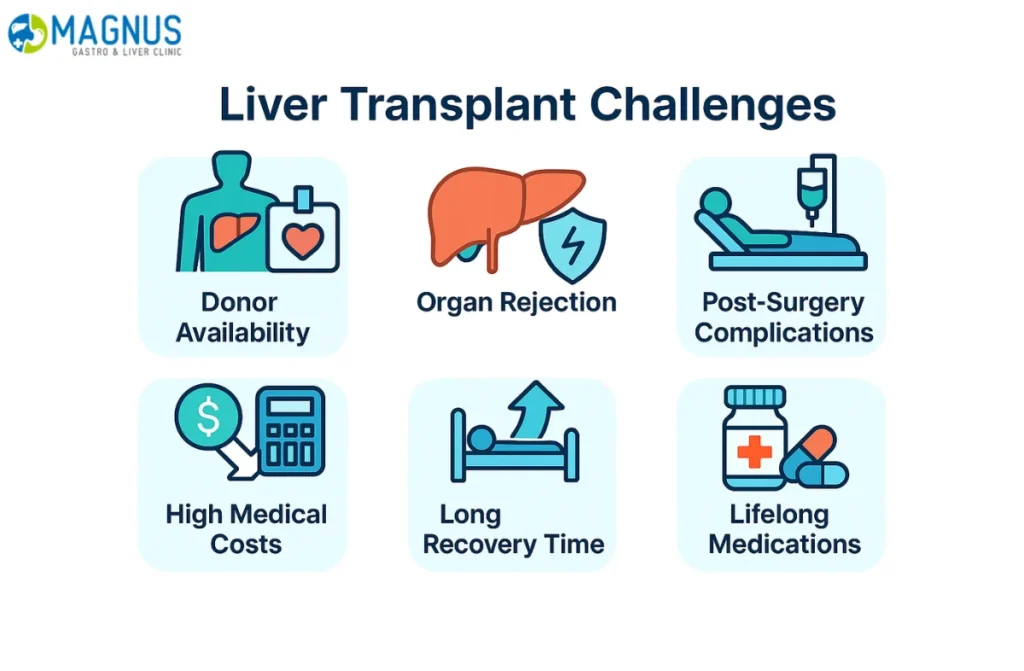A liver transplant is a major surgical procedure in which a damaged or non-functioning liver is replaced with a healthy liver from a donor. It is often considered a life-saving treatment for patients with severe liver damage caused by conditions such as cirrhosis, liver cancer, or acute liver failure. While the procedure has advanced significantly over the years, it still demands careful medical evaluation, surgical expertise, and long-term postoperative care. In India, the rising number of patients needing this surgery has brought attention to several pressing issues. This is where the topic of Liver Transplant Challenges in India becomes particularly important, as it highlights the gaps and obstacles that must be addressed to make the procedure more accessible and effective.
Liver Transplant Challenges in India
In India, liver transplant challenges in India are not limited to medical infrastructure but also stem from untimely diagnoses and faulty referral practices. Many patients are identified at advanced stages of liver disease, which drastically lowers the chances of a successful transplant. Adding to this, cultural barriers such as mistrust in medical systems, reliance on alternative remedies, or lack of awareness often delay patients from seeking timely treatment. These setbacks lead to progressive liver damage, making transplants riskier and outcomes less favorable. Tackling these challenges in transplant process in India calls for stronger medical outreach programs, improved healthcare education, and streamlined referral systems that ensure patients receive specialized care without delay.
Organ Donor Shortage
One of the most pressing Liver Transplant Challenges in India is the acute shortage of organ donors. As the demand for transplants continues to grow, the availability of suitable organs remains far below what is required. This shortfall creates a significant barrier to the overall success of liver transplantation nationwide. Limited public awareness, hesitation toward organ donation, and deep-rooted cultural perceptions worsen the problem. On top of that, legal and ethical complexities often slow down the donation process. Consequently, countless patients are forced to remain on waiting lists for long durations, and many tragically miss the opportunity for surgery making this among the most significant challenges in transplant process in India.
Compromised Access to Liver Transplantation
Access to Liver Transplantation in India is compromised due to physical limitations and inadequate medical infrastructure. Patients in rural areas face difficulties in reaching transplant centers, where specialized care is available. Medication for surgery is also a key concern; many cannot afford the long-term immunosuppressive drugs required post-transplant. This lack of accessibility contributes to higher mortality rates among candidates and results in delayed treatments. Addressing these Liver Transplant Challenges in India will require stronger healthcare infrastructure, improved outreach, and better affordability of essential treatments.

Financial Coverage
The steep expense associated with Liver Transplant Challenges in India remains one of the biggest obstacles for patients. A single procedure can cost several lakhs, factoring in diagnostic evaluations, surgery, post-operative care, and the ongoing need for immunosuppressive medication. For many families, these costs are financially overwhelming, making treatment inaccessible. Insurance policies, whether public or private, often provide only partial coverage, leaving patients burdened with significant out-of-pocket expenses. Expanding financial assistance through stronger government funding, wider insurance benefits, and private health initiatives is essential to ease this burden and encourage Affordable Liver Transplants in India for those in need.
Graft Allocation Systems
A key liver transplant challenge in India lies in the graft allocation process, which is guided by complex factors such as medical urgency, donor recipient compatibility, and waiting lists. Although designed to promote fairness, the system often creates delays and inefficiencies that impact patient outcomes. In several instances, Liver Transplant Challenges in India are intensified by unequal distribution and prioritization issues, leaving some patients without timely access to the organs they urgently need. Building a more transparent, efficient, and accountable allocation system is essential for ensuring equitable access and improving survival rates.
Future Directions in Liver Transplantation
Addressing the ongoing liver transplant challenges in India requires forward-looking solutions and medical innovation. The future of liver transplantation in India is likely to be shaped by breakthroughs such as xenotransplantation, where animal organs are adapted for human use, and advanced machine perfusion techniques that help preserve and improve the quality of deceased donor livers. These technologies hold the potential to ease the burden of organ shortages, lower the risk of graft rejection, and expand access to life-saving transplants. With continued research, policy support, and global collaboration, these innovations could transform outcomes for patients awaiting a transplant.
Tolerance and Immunosuppression Withdrawal
Among the critical challenges in transplant process in India is the management of immunosuppression and graft tolerance. After a transplant, patients must rely on lifelong medications to prevent organ rejection, but extended use of these drugs can heighten the risk of infections, kidney damage, and even certain cancers. Striking the right balance in tapering or withdrawing immunosuppressive therapy remains one of the most complex aspects of post-surgical care. This issue continues to add to the broader liver transplant challenges in India, underscoring the urgent need for advanced treatment protocols and safer immunosuppressive options that protect both patient health and graft longevity.
Machine Perfusion of Organs from Deceased Donors
An emerging solution to overcome liver transplant challenges in India is the application of machine perfusion for livers donated after death. This advanced technique sustains organ health by supplying oxygen and vital nutrients, allowing the liver to remain viable for much longer outside the human body. In a country where donor shortages persist, machine perfusion can expand the pool of usable organs, minimize wastage, and improve the success rates of transplantation. By preserving liver function more effectively, this innovation not only enhances patient outcomes but also strengthens the vision of Affordable Liver Transplants in India, giving new hope to those waiting for a life-saving procedure.
Increasing Donor Organs
Boosting the availability of donor organs is vital to addressing ongoing liver transplant challenges in India. Greater public awareness, well-structured educational initiatives, and efforts to dismantle cultural taboos around organ donation can play a pivotal role in narrowing the gap between demand and supply. Incentivizing donors and simplifying the donation process further encourage participation. With more organs available, waiting lists can be shortened, transplants can be performed more promptly, and countless lives could be saved paving the way toward Affordable Liver Transplants in India.
Liver Xenotransplantation
Another potential breakthrough in overcoming liver transplant challenges in India is liver xenotransplantation, the process of using animal organs for human transplantation. This experimental technique could help tackle the chronic shortage of human donor livers, offering hope to patients who face long waiting periods. Yet, significant hurdles remain, including the risk of immune rejection, transmission of animal viruses, and ongoing ethical debates. Continued scientific research and technological advancements are crucial before xenotransplantation can become a safe and practical option, but it holds promise as a long-term solution to India’s severe organ scarcity.
Expanding Indications – Non-Hepatocellular Carcinoma Liver Cancer
Broadening the eligibility criteria for liver transplantation to include patients with non-hepatocellular carcinoma (non-HCC) liver cancers could significantly increase access to this life-saving treatment in India. At present, liver transplants are largely limited to cases of cirrhosis and end-stage liver failure. However, with improved screening methods and well-defined selection protocols, more patients with complex liver cancers could be considered suitable candidates. Such an expansion would not only help meet the rising demand for transplants but also improve survival outcomes for a wider patient population across the country.
Facilities for Liver Transplant in India
India has emerged as a global hub for liver transplantation, offering advanced healthcare infrastructure that rivals international standards but at a far lower cost. Some of the standout facilities include:
- Advanced Surgical Equipment: Cutting-edge technology and minimally invasive techniques ensure precision and safety during transplants.
- Highly Skilled Specialists: Expert hepatologists and liver transplant surgeons, many with global experience, provide world-class care.
- Comprehensive Post-Operative Care: Specialized ICUs and round-the-clock monitoring deliver optimal recovery support.
- Affordable Liver Transplants in India: Cost-effective packages make India a top choice for both domestic and international patients.
With these strengths, Liver Transplantation in India is both accessible and reliable. At Magnus Jayaraj, we focus on connecting patients with the right medical expertise and facilities, ensuring seamless care without compromising on quality.
The Liver Transplant Process
The liver transplant procedure in India is designed with a patient-first approach, ensuring safety and long-term success. The process generally involves three key stages:
- Pre-Transplant Evaluation: Patients undergo detailed medical assessments, donor compatibility testing, and counseling sessions to prepare both the individual and their family for the procedure.
- Surgical Procedure: The damaged liver is carefully removed and replaced with a healthy donor organ, which may come from either a living or deceased donor. Throughout the operation, vital functions are closely monitored to ensure stability and success.
- Post-Transplant Care: Recovery includes regular medical follow-ups, the use of immunosuppressive medications to prevent organ rejection, and structured nutritional and physical rehabilitation programs.
While India offers world-class expertise in transplantation, challenges in transplant process in India such as the shortage of organ donors and the financial burden for many patients remain significant hurdles to overcome.
Liver Transplant Statistics in India
Over the past decade, India has made significant strides in improving liver transplant outcomes. Some notable statistics include:
- Success Rate: Survival rates after transplantation now exceed 85%, aligning with leading global benchmarks.
- Annual Volume: Nearly 1,800 liver transplants are carried out across the country each year, reflecting steady growth in medical capacity.
- Cost Advantage: Affordable liver transplants in India are generally 60–70% less expensive compared to similar procedures in Western nations, making the country a preferred destination for international patients.
Despite these achievements, persistent challenges in transplant process in India, including limited organ availability and risks linked to post-operative care highlight the need for continued innovation and stronger healthcare policies.
Conclusion
The liver transplant challenges in India remain complex, involving donor shortages, high costs, and limited access to specialized care. While India has advanced in surgical expertise and infrastructure, these barriers continue to affect patients in need of life-saving treatment. Emerging solutions such as machine perfusion and xenotransplantation show promise, but achieving long-term progress requires collaboration between medical experts, government authorities, and society. Expanding awareness, improving financial coverage, and strengthening organ donation systems will be key steps forward. At Magnus Jayaraj, we are committed to supporting patients by connecting them with trusted facilities and promoting affordable liver transplants in India, ensuring that more lives can be saved and hope restored for countless families.
Read Also: Best Hepatologist in India




